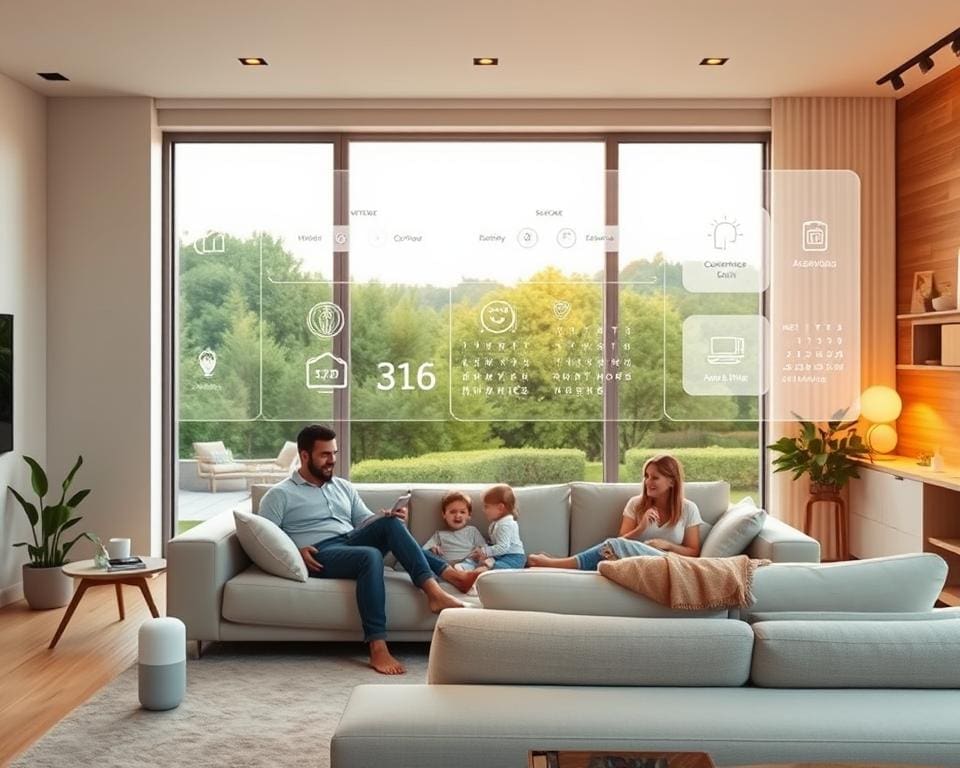The advent of technology has dramatically influenced our everyday lives and transformed work culture. This digital transformation, marked by innovations ranging from smart homes to automation, promises to enhance both convenience and efficiency. As we explore the multifaceted impact of technology on our daily routines and professional environments, it becomes clear that these advancements are not just trends but essential components of modern life. With an ever-increasing reliance on tech for productivity and personal comfort, the landscape of work is evolving, paving the way for a future ripe with possibilities.
The Digital Transformation of Daily Life
The advent of smart home technology has initiated a remarkable shift in daily life digitalisation, enhancing how individuals engage with their living spaces. The integration of home automation not only simplifies tasks but also redefines convenience, enabling seamless control of various household functions.
Embracing Smart Homes
Consumers are increasingly embracing smart homes, where devices communicate with each other and can be managed remotely. Systems like the Google Nest and Amazon Echo epitomise this transformation, allowing users to adjust lighting, temperature, and security settings from their smartphones. This level of automation delivers not only operational ease but also promotes lifestyle improvement, making daily tasks more efficient and enjoyable.
Impact on Daily Routines
The impact of smart home technology on daily routines cannot be overstated. A well-automated home can significantly reduce energy consumption, which contributes to both cost savings and environmental sustainability. With features that learn user preferences, smart homes create a tailor-made environment suited to the unique needs of inhabitants. This personalization transforms everyday tasks, giving individuals more time to focus on what truly matters in their lives.

Remote Work Revolution
The landscape of professional life has transformed significantly with the rise of remote work, ushering in a new era defined by flexibility and efficiency. This shift became particularly prominent during the pandemic, as businesses sought innovative ways to maintain productivity while ensuring the safety of their employees. As a result, virtual collaboration tools have become essential in fostering effective teamwork and maintaining communication across distances.
The Rise of Virtual Collaboration Tools
Platforms such as Zoom, Microsoft Teams, and Slack have revolutionised how teams interact, breaking geographical barriers and enabling seamless communication. These telecommuting tools support various functionalities, including video conferencing, instant messaging, and project management features. This array of options caters to diverse work styles and preferences, fostering a culture of collaboration that thrives outside traditional office settings.
Balancing Work and Personal Life
While remote work offers unparalleled flexibility, it also presents challenges in establishing a healthy work-life balance. Many individuals find themselves blurring the lines between personal time and professional obligations. To overcome this hurdle, it is vital to set specific working hours and create a dedicated workspace. Devices and software designed to enhance productivity can also assist in managing time effectively, allowing for personal responsibilities to coexist harmoniously with work demands. Emphasising boundaries is critical in ensuring mental wellness and sustaining long-term success in a remote environment.
How technology is shaping the way we live and work
In today’s fast-paced world, adapting to new work environments has never been more crucial. The shift towards hybrid models reflects a broader transformation where flexibility and innovation takes centre stage. Office spaces are being reimagined to align with the needs of both in-person and remote workers, fostering collaboration and enhancing creativity.
Adapting to New Work Environments
Companies are increasingly designing agile workplaces that cater to diverse working styles. Flexible spaces equipped with the latest productivity technology are now commonplace. This integration of modern tech in business facilitates seamless transitions between collaboration and independent work, allowing teams to thrive regardless of their location.
Enhancing Productivity through Tech Solutions
Employing advanced tools has a significant impact on productivity. Applications like Asana and Trello have become essential for efficient project management, streamlining operations and enhancing communication. AI-driven solutions optimise workflows and resource allocation, ensuring that businesses remain competitive. By embracing these technological advancements, organisations can elevate employee satisfaction and engagement, crucial in today’s ever-evolving work landscape.
The Evolution of Communication
As the landscape of professional communication continues to shift, the impact of technology on our interaction methods is undeniable. The rise of instant messaging and social media has significantly transformed business communication, making it more agile and interconnected.
Instant Messaging vs. Traditional Email
Instant messaging platforms such as Slack and Microsoft Teams have become essential tools for organisations. These applications offer rapid exchanges that foster immediate feedback, enhancing the efficiency of workplace discussions. In contrast to traditional email, which may encourage formality and delays, instant messaging promotes a more dynamic environment for communication. This evolution allows teams to respond promptly to challenges and opportunities, fundamentally changing how professionals interact.
Social Media and Its Influence on Professional Networking
Social media platforms like LinkedIn have revolutionised the realm of professional networking. Users can now effortlessly connect with peers, industry leaders, and potential employers. This accessibility not only expands networks but also promotes sharing of insights and best practices across various fields. The combination of instant communication and social connectivity strengthens professional relationships, creating a collaborative culture essential for today’s business ecosystems.
Healthcare Advancements through Technology
Recent developments in healthcare technology are transforming the way patients connect with medical professionals and manage their well-being. Telemedicine has emerged as a groundbreaking solution, revolutionising access to healthcare services. Patients can now receive consultations from the comfort of their homes, bridging distances and promoting a healthier society.
Telemedicine: A New Era of Health Services
Telemedicine exemplifies the fusion of technology with health innovation. Platforms like Babylon Health enable individuals to consult with healthcare providers via video calls. This approach not only enhances convenience but also reduces the strain on traditional healthcare systems. By ensuring that patients receive timely advice, telemedicine addresses various health issues promptly, creating a more responsive healthcare ecosystem.
Wearable Devices for Health Monitoring
In parallel, the rise of wearable health devices has empowered individuals to take charge of their health. Gadgets such as Fitbit and Apple Watch allow users to monitor vital signs and physical activity effortlessly. This real-time data collection fosters proactive health management and encourages healthy lifestyle choices. As people embrace these innovations, the potential for improved health outcomes grows, reducing the burden on healthcare services.
Education Reimagined
The landscape of education has transformed dramatically with the rise of technology. Online education has opened new avenues for learners of all ages, making knowledge more accessible than ever before. Platforms like Coursera and Khan Academy exemplify the potential of e-learning, catering to various learning styles and schedules. This shift is not limited to remote settings; it extends into traditional classrooms where classroom technology enhances the educational experience.
Online Learning Platforms
Online learning platforms have revolutionised the way students engage with educational content. These resources offer flexibility and variety, empowering individuals to take charge of their learning journey. From video lectures to interactive quizzes, the e-learning format accommodates different preferences, ensuring that everyone has the opportunity to succeed.
Interactive Technologies in Classrooms
Classroom technology has made considerable strides, introducing interactive learning methods that captivate students and provide immersive experiences. Tools such as smart boards and virtual reality applications foster collaboration and creativity among peers. By integrating these innovations, educators can enhance critical thinking skills, making lessons not only informative but also engaging.
Financial Technology and Its Impact
The emergence of financial technology has dramatically altered the landscape of personal finance management. Innovations in online banking and mobile payments provide individuals with unprecedented control and convenience. Consumers now seek smarter, more efficient ways to handle their finances, which has led to a notable shift in traditional banking practices.
Online Banking and Mobile Payments
Online banking platforms like Monzo and Revolut have redefined how users interact with their finances. These services offer users tools for budgeting, real-time transaction alerts, and the ability to manage multiple accounts seamlessly. The rise of mobile payments through systems like Apple Pay and Google Wallet has further transformed the shopping experience, allowing for secure, contactless transactions. Individuals appreciate the blend of flexibility and safety these tools provide, making day-to-day spending more efficient.
Investment and Trading in the Digital Age
Digital investment platforms such as eToro and Robinhood have democratised access to financial markets, enabling retail investors to participate in trading like never before. This shift promotes financial literacy, making it easier for people to understand investment concepts and strategies. Individuals can now explore various assets, learn about the stock market, and manage their investment portfolios via mobile applications. The availability of educational resources and user-friendly interfaces empowers a new generation of investors to take charge of their financial futures.
Sustainable Living through Innovation
Innovation in technology is fundamentally reshaping our approach to living sustainably. As society becomes increasingly aware of environmental challenges, sustainable technology emerges as a beacon of hope, providing eco-friendly solutions to everyday issues. Advances such as solar panels and energy-efficient appliances not only reduce energy consumption but also enable individuals and families to embrace a more sustainable lifestyle, showcasing the potential for green innovation to transform our homes and communities.
Companies like Tesla are at the forefront of this movement, making electric vehicles a practical choice for consumers eager to lower their carbon footprints. Local eco-friendly startups also contribute significantly, offering unique products that align with the growing demand for sustainable options. By integrating these technologies into daily life, consumers can support a shift towards a greener economy while enjoying the benefits of a more responsible way of living.
The rise of smart technologies further amplifies this trend, as devices designed to monitor energy use optimise consumption patterns in both residential and commercial settings. This not only aids in reducing greenhouse gas emissions but also fosters a culture of environmental responsibility. Embracing sustainable innovation is not just a trend; it’s a crucial step towards mitigating climate change and ensuring a healthier planet for future generations.









